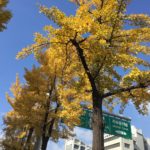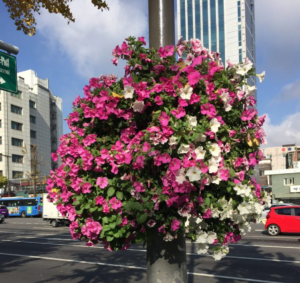Seoul, Korea
Monday 11 November 2019
Autumn yet clings to the trees of Seoul and, surprisingly, petunias are blooming in the street baskets. Immersed as I am researching nineteenth-century Korea, my head is filled with images of the Seoul and Korea of that period. Thus, the prosperity and well-being of today’s Seoul continually amazes me. And people In general dress more formally here, so everyone immediately looks more prosperous. I asked Jasmine if this affluence is seen throughout Korea, and she assures me it is. In Seoul and at the Incheon airport, everyone looks healthy and young and prosperous.
In Korea, a formality marks the professionals and particularly, as I have found, the academic community. In America, instructors and even titled professors will have office hours. A student or an unknown can roam the halls, and if it is an office hour, wander in, introduce one’s self, and chat away with the great man or woman. Not so in Korea. To meet a prestigious academic, you need an introduction from several levels down. It is much like getting a book published in America. First, you find an agent who is an agent-finder. The agent-finder finds you an agent. The agent may find you a publisher. In Korea, you find a friend of a friend who can introduce you one level up, and after that you keep working your way up until you have a personal introduction to your target.
You then meet your target at the restaurant and pay for a meal that costs a hundred or more for your party of three. My forty-dollar box of chocolates seems mighty insignificant. These tight hierarchical channels of today seem basic to Korea culture and surely have their source in the force of Confucian dogma that demands total subservience of the son to the father, the father to the ancestors, etc., etc. The early missionaries often write of how little personal ambition Koreans evidenced. But it was a matter of self-protection.The King demanded tribute from the yonban. The yonban demanded from the magistrate, and the magistrate would simply squeeze more out of the lowly peasant. This was “The Squeeze.” If a peasant suddenly became prosperous, the magistrate would drum up some charge and arrest him. After a few beatings, the peasant was happy to let go of his newly acquired wealth. Understandably, the nineteenth-century Korean peasant saw little advantage in the extra work required to improve his income.
Please note that I use “his” here in referring to nineteenth-century Koreans. There was no opportunity for Korean women to have an income.



